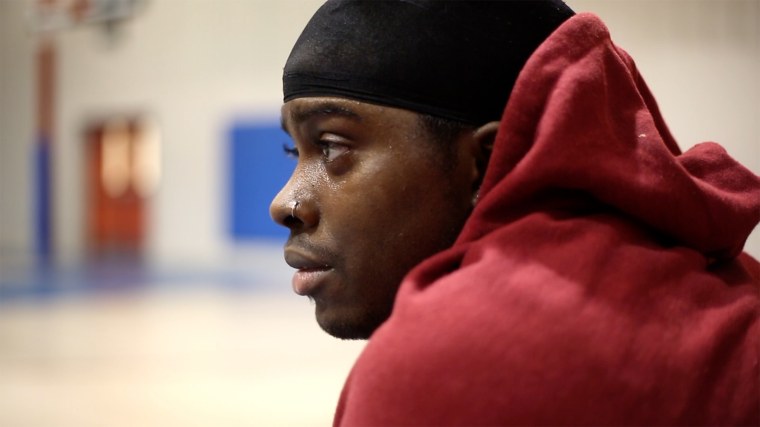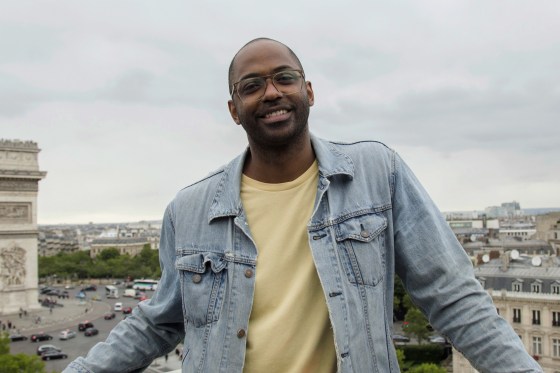When the 2019 Oscar nominations were announced, there was a ton of excitement for Spike Lee, who received his first best director nomination for “BlacKkKlansman,” and for “Black Panther,” which became the first Marvel film nominated for best picture.
But a lot of folks missed that newcomer RaMell Ross was nominated for his first documentary, “Hale County This Morning, This Evening.” It is a film capturing a community in the Alabama Black Belt primarily through the lives of two young black men as they navigate everyday life and enormous challenges of family, education, early parenthood, low-paying jobs and just surviving the lingering cruelty of Jim Crow laws and slavery. In between, “Hale County” reveals a fabric of black Southern life rarely captured on film, especially in contemporary form.
Ross, an acclaimed photographer whose work has been featured in The New York Times and on book covers, went to Greensboro, Alabama, to teach a two-week photography class. Ultimately, Ross, a one-time standout basketball player who went to Georgetown on a scholarship, stayed in Greensboro to work in a youth program and coach basketball. There, he met Quincy Bryant and Daniel Collins. That ensuing friendship evolved into the documentary focusing on the area that is about 60 percent black. In all, Ross spent almost 10 years in the area — he lived there three years before even embarking on the film and spent five years actively filming.
Unlike many documentaries, there are no talking heads. Dialogue of any kind is very limited. Ross practically creates new rules for making documentaries and offers one of the very few about black people helmed by a black person. NBCBLK caught up with Ross to discuss his work and its significance ahead of its premiere on PBS, on Feb. 11 at 10 p.m., as part of the network’s acclaimed Independent Lens series.

What sparked you to do the film?
Ross: I was already making images, and I was already a photographer. So, while I was working in the youth program and coaching at the local high school, I was making images, and I think I got to the point where I felt that there’s some other offering that an art form could provide to understanding what it means to be there, and what it means to be seen there, and what it means to be part of this history that is the origin of black representation in some sense or the black experience. And it started out very, very modest. I had no intention of it being this huge thing. I started documenting my friends and shooting these two guys that I was really good friends with and it kind of grew.
You capture some of the lyrical beauty of the South that often gets lost in all the horrors black people especially have endured.
Ross: I think that was it. I was there and this is my life and this is my new community. I’m so integrated in the daily life of a lot of folk because I’m working with students, getting them GEDs, and assisting them in getting career development and coaching. That lifestyle was something I hadn’t seen before and the reality that I was participating in in the cinematic form.
In "The Souls of Black Folk," when DuBois went to Fisk, that was the first time he was truly encountering this Southern black experience and the power and spirit of that, and you capture a version of this experience in your film.
Ross: I don’t think there is anything more important for people to understand than that. I think “Hale County” is very much about the experience of a black man returning to the South, experiencing and interfacing with the lives of other folk, like what is it like to look through those eyes and to be in that world and then you realize that the only way for someone to know anything about anything is to actually have an experience of it. . . Cinema is so early that it sometimes is very much serving language and not serving experience, and I think that serving experience as it relates to the black experience, however big and vast and multifaceted it is, is an interesting way to understand it or to encounter it.
Were you returning to the South or seeing it for the first time?
Ross: I think this is where Baldwin is so distinct in his ability to articulate things that are universal for large groups of people. He said Negro but I will just edit it to black man; he said ‘For a black man to return to the South is to return to a place he’s never seen but one he can’t fail but recognize.’ It’s a conceptual return, but it’s a place that is generally speaking lodged in my memory; it’s lodged in the cultural memory. It’s in my blood through my father’s stories; it’s through Richard Wright; it’s through Faulkner; it’s through Sally Mann’s photographs. It’s such a mythical space that when you come, that beauty is so familiar but then also the horror that is in between the sort of totems of culture is also what accompanies it.
You capture so many nuances in the documentary like the varying complexions of black people and you also manage to create an individual and collective narrative that is much warmer than a lot of documentaries. To what do you attribute that to?
Ross: The familiarity with whomever is in front of the lens determines the aesthetic. . . . To me, when I look at Daniel and Quincy, I’m literally looking at my brother, and I give them that sort of grace and I use the camera with that sort of familial expectation of a rendering. . . . I’m looking for things that are more participatory and less of a capture. I like to think of the film and the camera use as something that I call observational logic where you’re like using it as an extension of your consciousness, and you’re way more interested in living your own life in their lives, participating more than capturing, and that sort of lends itself to less spectatorship.
There are so many times where words of wisdom burst out of nowhere.
Ross: Those moments are so moving to me. It’s so important for people to understand that there is a relationship between time and meaning. A lot of times when folks are making documentary films, they are jumping into a community and their budgets and the time spent is based on a wider budget they’ve gotten from some nonprofit or whatever method they’ve worked out, so they don’t have time to let these moments show themselves in real life.
What does "Hale County This Morning, This Evening" receiving an Oscar nomination mean to you?
Ross: It’s such a big thing. The film getting nominated for an Oscar means more to me about the acknowledgment of the centrality of the black experience from the South, and the problem of documentary, and in a lot of film, of reducing story and narrative into these preconceived tropes and structures just sort of contributes to narrow understandings of what it’s like to be a person of color. And for that to be received by an audience as wide as the documentary branch who are filmmakers who have made the best documentary films, for that to be part of the cultural conversation now, is a little overwhelming to think about.
